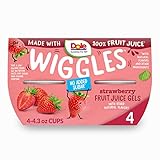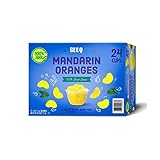If are you confused about the carbs in mandarin oranges, you are in the right place. Here you can get every information about what actually mandarin oranges are.
So, Let’s start.
Page Contents
What Are Mandarin Oranges
A kind of citrus fruit belonging to the Rutaceae family is the mandarin orange. They have thin, peel-able skin and are often round or oval in size. A mandarin orange generally has juicy, sweet, and seedless flesh. Mandarin oranges are originally from China. But they are now extensively produced around the world, especially in the US, Spain, and Italy.
They are frequently used in salads, desserts, and other foods and eaten fresh as a snack. They are a typical component of conventional Chinese medicine and are also used to create juice.
Some Important Information About Carbs in Mandarin Oranges
For those watching carbs in mandarin oranges consumption, mandarin oranges are a fruit alternative that has comparatively few carbohydrates. Here are some crucial details regarding the carbohydrates in mandarin oranges:
- About 11 grams of carbs may be found in one medium-sized mandarin orange
- These 11 grams of carbs are made up of 2 grams of dietary fiber and 9 grams of sugar
- Mandarin oranges have a low glycemic index (GI), which means they have little effect on blood sugar levels
- Mandarin oranges are an excellent source of vitamin C, offering around 70% of the daily required amount in only one fruit
- Despite the fact that oranges are one of the lower-carb fruits. It’s still crucial to watch your portion sizes and keep the overall balance of your diet in mind
Is Taking Carbs in Mandarin Oranges Healthy For us?
Indeed, mandarin orange consumption when included in a balanced diet can be beneficial for the majority of people. Mandarin oranges are a wonderful source of dietary fiber, vitamin C, and other nutrients. The fact that they do contain carbs. While vitamin C is crucial for immune function, wound healing, and iron absorption, fiber is crucial for sustaining digestive health.
In addition, the majority of the carbs in mandarin oranges are simple sugars, which the body readily absorbs for energy. This is advantageous for athletes or anyone who want a rapid source of energy.
But, moderation is vital with all foods. Carbs in mandarin oranges may be a beneficial addition to a healthy diet, but it’s vital to eat them in moderation and take into account the overall balance of your diet to make sure you’re receiving a variety of nutrients from other food sources.
Here is how you can intake mandarin orange Amazing Mandarin Orange Salad Recipe.

Does Consume More Carbs in Mandarin Oranges Can Cause Side Effects?
Mandarin orange consumption in moderation is unlikely to have any significant side effects, especially in healthy people. Nevertheless, ingesting a lot of mandarin oranges or any other fruit with a lot of carbs may result in certain negative consequences, like:
Blood sugar levels rising: The natural sugars included in carbs in mandarin oranges have the potential to increase blood sugar levels. Mandarin orange consumption in high quantities can result in a sharp rise in blood sugar levels, which may be dangerous for those with diabetes or insulin resistance.
- Digestive problems: Eating excessive quantities of fiber, such as the fiber in mandarin oranges, can result in digestive problems including bloating, gas, and diarrhea. If you eat a lot of oranges quickly, the likelihood of this happening increases
- Weight Gain: Eating too many carbs over the long term, regardless of where they come from, can result in weight gain. This is especially true if you consistently consume more calories than you burn off
- Generally, it is doubtful that eating modest amounts of mandarin oranges as part of a balanced diet would have any unfavorable impacts. It’s always advisable to speak with a healthcare provider if you have any questions about eating mandarin oranges or any other food, though
Nutritional Values of Mandarin oranges
Mandarin oranges are a nutritious fruit that provides several important vitamins and minerals. Here are the approximate nutritional values for one medium-sized mandarin orange:
- Calories: 47
- Carbohydrates: 11 g
- Fiber: 2 g
- Sugar: 9 g
- Protein: 1 g
- Fat: 0 g
- Vitamin C: 63% of the daily value (DV)
- Vitamin A: 6% of the DV
- Calcium: 2% of the DV
- Potassium: 4% of the DV
Mandarin oranges are very rich in vitamin C, which is necessary for collagen formation, wound healing, and immune system health. They are also an excellent source of potassium, essential for keeping appropriate blood pressure levels, and dietary fiber, which is crucial for supporting digestive health.
The nutritional content of carbs in mandarin oranges might vary significantly depending on the size and freshness of the fruit, so it’s important to keep that in mind.
Season
Depending on the area and temperature, there are several reasons to eat mandarin oranges. Mandarin oranges are often in season throughout the winter in various regions of the world. Because of their popularity as gifts during the Christmas season, they are frequently connected to that time of year.
Mandarin oranges are normally in season in the United States from November through April, with the peak months being December and January. Mandarin oranges could be in season sooner or later in different regions, such as China and Japan.
How Many Percent of People Love to Eat Mandarin Oranges?
The percentage of people who enjoy eating the carbohydrates in mandarin oranges cannot be determined without performing a poll or research, hence there is no conclusive answer to this topic. Mandarin oranges, however, are an excellent fruit option for many individuals because of their sweet flavor and great nutritional value.
Carbs in mandarin oranges are a tasty and healthful source of carbohydrates that some individuals may choose to have in their diet while others may prefer to restrict for health or personal reasons. The proportion of people who like eating the carbohydrates in mandarin oranges will ultimately rely on personal tastes and dietary requirements.

Conclusion
In conclusion, mandarin oranges are a fruit that is filling and tasty and is rich in fiber, vitamin C, and other essential vitamins and minerals. They may be used as a healthful snack or used in a number of dishes while they are in season throughout the winter in various areas of the world.
Mandarin orange consumption in moderation is unlikely to have any adverse effects, but it’s crucial to watch portion sizes and speak with a doctor or qualified nutritionist if you have any questions about eating mandarin oranges or any other food.
We have more related articles you may check,
- Are You Excited to Try Mandarin Orange Salad?
- The Delicious Mandarin Chicken Recipe
- Amazing Health Benefits of Oranges Eating Every Day
- Mandarin Orange Chicken: A Delicious and Popular Chinese
FAQs
Mandarin oranges are a type of citrus fruit that is smaller and sweeter than regular oranges. They are also easier to peel and have thinner skin.
Yes, mandarin oranges are a nutritious fruit that is high in vitamin C, fiber, and other important vitamins and minerals.
Mandarin oranges can be stored at room temperature for a few days, but they will last longer if kept in the refrigerator. It’s best to store them in a plastic bag or container to help retain their moisture.
To peel a mandarin orange, use your fingers to loosen the skin at the top of the fruit, then gently pull the skin away from the flesh, working your way around the fruit. The segments should come apart easily.











